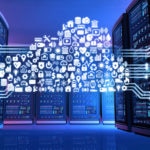Nuria Oliver: "When speaking of artificial intelligence, it is important to be accompanied by ethical recommendations"
Ms. Oliver, a telecommunications engineer with a PhD awarded by the Media Lab of the Massachusetts Institute of Technology (MIT) and Science Manager at Telefónica, highlights the value of data: "for the first time since our existence as a species, we are able to obtain quantitative data".

"Let's just do it and we'll ask for permission later". Nuria Oliver -a telecommunications engineer with a PhD awarded by the Media Lab of the Massachusetts Institute of Technology (MIT) and Science Manager at Telefónica- speaks and talks very quickly. She doesn't have time to miss the United States - where she worked at Microsoft for 12 years - although she insists on the more "proactive" attitude in that country - "they don't wait for permission before they take on a project" - and the "lack of conformism" to group values.
“In Spain we are very group-oriented and it is very difficult to be innovative and different and break out of the status quo if you do what everyone else does. Different gets pummeled”. Oliver defends diversity, “fundamental to improve yourself”, and -before the interview- she participated in the Thinking Party event organized by Telefónica Foundation Space with a master class called Technology and Brain, an exceptional duality to highlight the progress being made in artificial intelligence.
She also highlights the value of data: "for the first time since we exist as a species, we are capable of obtaining quantitative data -what we do, where we go, what we like, how we interact-; it's a small revolution that began 6 years ago and enables us to validate or not sociological theories thanks to the data and collective intelligence techniques that are available".

Nuria Oliver, telecommunications engineer
What is the challenge for Big Data?
There are many challenges of many kinds. Some are very technical and have to do with extracting relevant information from immensely large amounts of data. If nobody is capable of interpreting these data, analyzing them or making use of them, it comes down to digital trash. On the one hand, the challenge is the capacity - through artificial intelligence techniques and data analysis - to extract relevant information and, at the same time, to know what to do with that information and knowledge derived from Big Data. The storage and generation of these data is advancing constantly.
What is the value of data?
Many decisions are already made on the basis of data analysis in all spheres. We can digitalize biology by digitalizing our body through images or analysis of DNA... the challenge is to find patterns that allow us to associate them with certain diseases, to predict diseases.
And in banking?
The situation in banking is impressive and very advanced in the context of Big Data. It has been digitalized for many years now. There are all kinds of analyses to understand, predict behavior, detect fraud, identify trends or to know what is going to happen beforehand. All that can be done by using the data. The stock exchange is already completely digital. Most transactions are artificial intelligence systems.
In trade almost everything is based on the design of data, modelled according to the needs of people, recommendations…
Are the techniques used to interpret data correct?
This research area is very active, it is obvious that we haven't reached the end, because new date sources are being used. One of the challenges is to combine data from different sources to extract even more interesting information, information that is more sophisticated. Predicting is very difficult, the predictive models are very difficult in many contexts and it is also very difficult to have the data in real time on many occasions.
Do you think restrictions should be established for artificial intelligence?
It depends on how it is used. To save lives, probably not. To cross ethical and moral limits, evidently yes. It is important for data analysis recommendations to be accompanied by ethical recommendations as to where it makes sense or doesn't make sense.
We are at a historical moment where technology is increasingly present in our lives; just as we have conversations about ethics with other people, we will have to have conversations about the impact on ethics that this technology has in our daily lives.
As a citizen, are you worried about where your data goes?
Yes, in fact people are becoming increasingly aware of the data that are being captured and where that personal data are going. The two fundamental principles that we are working on at Telefónica are the principle of control: if they are personal data, I have to have control over what happens with my data and the principle of transparency: that I really know what my data are being used for. Transparency as regards data use and having control so I can change that use if I don't agree.
What has to be done for technology to enrich us as a species?
As we develop this intimate relationship with technology, we are redefining who we are as a human species; the technology will be inside us and understand us, change our skills, I think it is very important for there to be more technological knowledge. The first step is to know where we are. We can then have an intelligent conversation about where we are and make decisions. All technological progress should be for the good of humanity and that is the conversation we should all be having together.
How much ignorance is there as regards Big Data?
Not specifically about Big Data, but about technology. There is too little talk about technology in society. We talk a lot about politics, soccer, but our average knowledge about technology is very poor. We use technology every day but our level of technological knowledge is shallow. Other than my scientific work, what matters the most to me is disseminating knowledge, opening up horizons so people understand where we are, technologically speaking. Young people have to be inspired and educated. I think having more scientific and technological knowledge is essential.
Does the digital gap between countries worry you?
It forms part of the conversation we should have as a society. Information is power and we access it digitally. Technology can make access to information and education democratic, much more than any traditional method, but we can't forget the gap there is and have to try to prevent it from getting larger. It is important to be aware of the digital gap because we survive as a human species if we all survive.